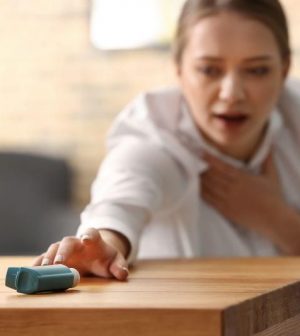- The Long-Term Effects of Daily Turmeric Supplements on Liver Health
- Could Your Grocery Store Meat Be Causing Recurring UTIs?
- Are You Making This Expensive Thermostat Error This Winter?
- Recognizing the Signs of Hypothyroidism
- 10 Strategies to Overcome Insomnia
- Could Artificial Sweeteners Be Aging the Brain Faster?
- Techniques for Soothing Your Nervous System
- Does the Water in Your House Smell Funny? Here’s Why
- Can a Daily Dose of Apple Cider Vinegar Actually Aid Weight Loss?
- 6 Health Beverages That Can Actually Spike Your Blood Sugar
When States Legalize Marijuana, Teens’ Asthma Rates Rise

Cannabis use in U.S. states where recreational use is legal could be contributing to children’s asthma, according to new research.
A study found increases in asthma in teens where cannabis is legal, compared to states where it remains banned for medicinal and recreational use. The study also found increased asthma in children in some minority and ethnic groups.
“Our findings suggest that state-level cannabis policy could have downstream impacts on children’s respiratory health,” said study first author Renee Goodwin, an adjunct associate professor at the Columbia University Mailman School of Public Health.
Cannabis use on the rise among adults with children in the home, particularly in states that have legalized it for medical or recreational use, she noted.
“Exposure to secondhand smoke is a key risk factor for asthma among children,” Goodwin said in a university news release. “This study offers a critical first step in identifying a key children’s health concern emerging in the context of rapid, ongoing changes in cannabis policy that are unaccompanied by clinical or public health guidelines for parents.”
Researchers used data from the 2011-2019 National Survey on Children’s Health. It offers a snapshot of the physical and mental health of non-institutionalized U.S. children through age 17.
Nationwide, they found a statistically significant drop in pediatric asthma between 2011-2012 and 2016-2017. They saw no decline since then.
Asthma rose slightly among 12- to 17-year-olds and non-Hispanic children in states where cannabis was legal for adult recreational use compared to states where it was illegal.
Goodwin led an earlier study that cannabis use was seen in 12% of parents in states where recreational use is legal; 9.5% of those where it was legal for medical use, and 6% where it was illegal.
“Increased adult cannabis use across the U.S. may inadvertently impact asthma among youth,” Goodwin said. “In the context of rapidly increasing legalization of adult [21 and older] use and commercialization in the U.S., an evidence base is urgently needed to inform legislators, policymakers, clinicians and the public on the potential heath impact of increasing secondhand cannabis smoke (SCS) exposure among children.”
She noted that no clinical or public education about child exposure is routinely offered to parents.
Asthma is the most common chronic condition in U.S. kids, affecting about 5 million.
“While tremendous progress has been made in asthma management in concert with tobacco control over the past several decades, the possibility that increased adult cannabis use may pose new risks, requires more in-depth study,” Goodwin said.
In particular, researchers need to learn whether secondhand cannabis smoke is associated with frequency of asthma attacks, use of rescue medicine, missed school days and emergency medical service, she said.
Goodwin called for more research to gauge the consequences before — or at least at the same time as — widespread commercialization of cannabis.
The findings were recently published online in the journal Preventive Medicine.
More information
The U.S. National Library of Medicine has more on asthma in children.
SOURCE: Columbia University Mailman School of Public Health, news release, Jan. 11, 2023
Source: HealthDay
Copyright © 2026 HealthDay. All rights reserved.










